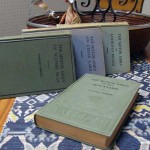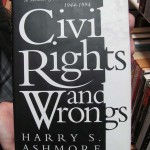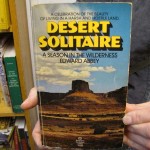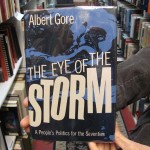
Ever hear of the Stratemeyer Syndicate? We hadn’t either…so off to Wikipedia we traipsed. It’s hard not to associate the word “syndicate” with gamblers or organized crime. It’s nice to know that this particular syndicate refers not to nefarious or harmful activity but, rather, to “the first book packager to have its books aimed at children, rather than adults.” And, come to find out, without them, we wouldn’t have Nancy Drew, The Hardy Boys, Tom Swift, The Bobbsey Twins or The Motor Girls, the latter of which were given as a series of four from “Mother and Daddy” to their daughter, “Miss Rowena Callendar.” This is the first inscribed collection we’ve seen. While, on the one hand, it’s kind of sad to see these books discarded, it was a really fun find.
Continue Reading


